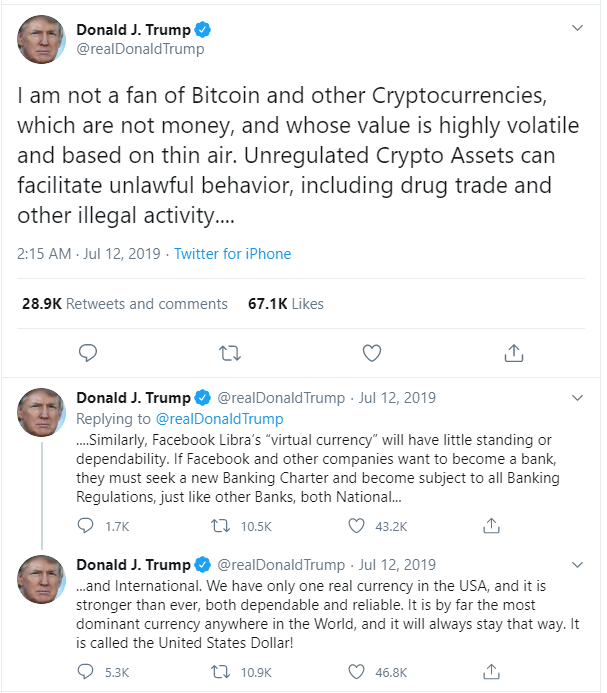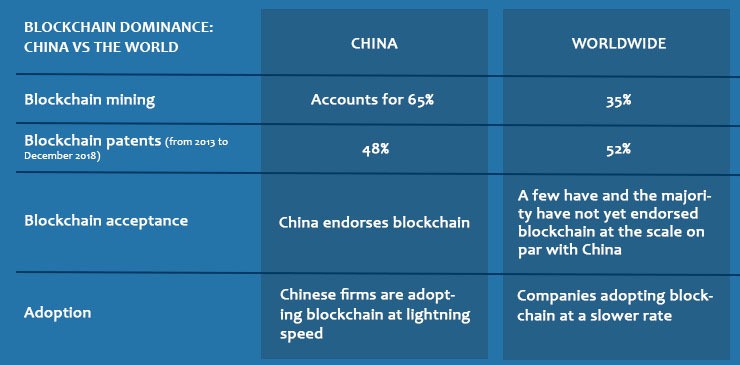
China is pushing for technological dominance in strategic sectors from artificial intelligence to blockchain. The Communist Republic has thrown its weight behind blockchain and assumed a leading position in the nascent technology. As China forges ahead with its blockchain aspirations, has it left the rest of the world behind? How did China get to where it is as far as blockchain technology is concerned? Does China know something that the rest of the world doesn’t?
China and its blockchain dominance
China has long been considered an imitator of technology. To move away from this negative view, the world’s second-biggest economy has identified technologies it wants to invest time and effort in. Blockchain is one of those technologies. These are some of the reasons why China is leading the blockchain race.
Pro-blockchain Government
The Chinese government, led by President Xi Jinping, is blockchain-friendly despite a hostile stance against bitcoin and cryptocurrencies. Bitcoin is the first successful application of blockchain.
In 2019, President Jinping gave a speech in which he sang the praises of blockchain and tasked his country to take a lead in the advancement of the emerging technology. He said his country should “seize the opportunity” presented by blockchain as the technology could benefit several industries such as education, finance, and healthcare.
President Jinping’s call for his country to support blockchain research, development, and standardization cannot be taken for granted. He is the first leader from a major economy to publicly endorse blockchain technology. His speech fueled an already super-charged distributed ledger technology sector in his country.
While China sees blockchain as an “important breakthrough,” other countries are yet to take a solid position on blockchain.
Central Bank Digital Currency (CBDC)
China’s central bank, the People’s Bank of China (PBoC) is ramping up efforts to create a central bank digital currency (CBDC). The state-issued digital currency, which is still in the pilot stage, could potentially replace cash with a blockchain-based solution.
China might have a different motive for developing the digital currency. According to a report published by the Foundation for Defense of Democracies (FDD), U.S. adversaries are turning to blockchain technology for sanction relief. China, alongside countries such as Iran, Russia, and Venezuela, is trying to build a new payment system outside the U.S. dollar. China intends to undermine the U.S. economic influence aided by the use of the dollar as the world’s reserve currency.
While other countries have shown the willingness to develop national digital currencies, a handful are doing so at the pace of China. China accelerated the development of its national digital currency after social network giant Facebook announced the Libra project. Libra was described as a stablecoin tied to a basket of major fiat currencies such as the dollar, Euro, British Pound, Japanese Yen, and more.
America was not pleased. Facebook CEO Mark Zuckerberg received criticism from several U.S. lawmakers for the proposed Libra stablecoin. Other European countries such as France joined the chorus in shooting Libra down. The U.S. President Donald Trump tweeted that he is “not a fan” of cryptocurrencies.

U.S. President Donald Trump is not a fan of cryptocurrencies | Credit / Twitter
Cryptocurrency enthusiasts feel that the U.S. and European nations are shunning innovation that China is welcoming with both hands. The rest of the world should not only talk about distributed ledger technology but teach practical blockchain projects that unlock the potential of their citizens.
China Plays a Crucial Role in Bitcoin Mining
A 2019 report by CoinShares suggested that Chinese miners account for roughly 65 percent of the bitcoin hashrate. The province of Sichuan alone accounts for 54 percent of the global hashrate. Although this figure is expected to fall as other markets lay their hands on the latest-generation mining equipment, China already has a stronghold in the sector. Chinese miners enjoy the lion’s share of the network hashrate due to the availability of cheap electricity and affordable resources.
China unbanned cryptocurrency mining after President Jinping called for the country to make advances in blockchain technology.
Bitmain, F2Pool, and Canaan — three major companies accounting for the large portion of bitcoin hashrate — are based in China. The country is also home to Bitmain, Canaan Creatives, and Ebang, which are the leading manufacturers of cryptocurrency mining equipment.

China vs. the world: Blockchain dominance
China’s dominance does not end with Bitcoin but extends to other blockchain protocols. According to EOS Authority, at least 19 percent of the network’s leading block producers are based in China.
Chinese Companies Adopt Blockchain at Lightning Speed
Chinese companies are adopting blockchain technology at high speed. Ledger Insights data show that Chinese firms dominate global blockchain patents. From 2013 to December 2018, companies based in the Asian country filed for 4,435 blockchain patents or 48 percent of the total blockchain patents. The greater number of blockchain patents shows that the country will likely have a bigger influence on the sector.
Blockchain Race Continues
The blockchain race is far from over but China is leaving its competitors behind. The country’s cheap electricity is a big factor in attracting bitcoin miners. The government, which has endorsed blockchain, has made it easy to attract blockchain-focused companies. China is simply seizing the opportunity while other countries are yet to make up their minds. As time flies by, China gains the first-mover advantage and the rest of the world can only play catch up.







